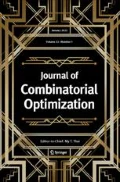Abstract
The notion of linear fpt-reductions has been recently introduced to derive strong computational lower bounds for well-known NP-hard problems. In this paper, we formally investigate the notion of W[t]-hardness under the linear fpt-reduction, and study the structural properties of the corresponding complexity classes. Additional complexity lower bounds on important computational problems are established. Some observations on structural properties of the standard parameterized hierarchy, the W -hierarchy, are also presented.
Similar content being viewed by others
References
Ausiello G, Crescenzi P, Gambosi G, Kann V, Marchetti-Spaccamela A, Protasi M (1999) Complexity and Approximation – Combinatorial Optimization problems and their Approximability Properties, Springer
Ausiello S, D'Atri A, Protasi M (1980) Structure preserving reductions among convex optimization problems, Journal of Computer and System Sciences 21:136–153
Bodlaender HL, Fellows MR (1995) $W[2]$-hardness of precedence constrained $k$-processor scheduling, Operations Research Letters 18, pp. 93–97
Cai L, Chen J (1997) On fixed parameter tractability and approximability of NP optimization problems, Journal of Computer and System Sciences 54:465–474
Cai L, Juedes D (2003) On the existence of subexponential parameterized algorithms, Journal of Computer and System Sciences 67:789–807
Cai L, Juedes D, Kanj IA (2002) Inapproximability of non NP-hard optimization problems, Theoretical Computer Science 289:553–571
Cesati M, Trevisan L (1997) On the efficiency of polynomial time approximation schemes, Information Processing Letters 64:165–171
Chen J (1991) Characterizing parallel hierarchy by reducibilities, Information Processing Letters 39:303–307
Chen J, Chor B, Fellows M, Huang X, Juedes D, Kanj I, Xia G (2004) Tight lower bounds for certain parameterized NP-hard problems, Proc. 19th Annual IEEE Conference on Computational Complexity (CCC 2004), pp. 150–160
Chen J, Huang X, Kanj I, Xia G (2004) Linear FPT reductions and computational lower bounds, Proc. 36th Annual ACM Symposium on Theory of Computing (STOC 2004), pp. 212–221
Chen J, Kanj IA, Jia W (2001) Vertex cover: further observations and further improvements, Journal of Algorithms 41:280–301
Downey R, Estivill-Castro V, Fellows M, Prieto-Rodriguez E, Rosamond F (2003) Cutting up is hard to do: the parameterized complexity of $k$-cut and related problems, Electronic Notes in Theoretical Computer Science 78:205–218
Downey R, Evans P, Fellows M (1993) Parameterized learning complexity, Proc. 6th ACM Workshop on Computational Learning Theory, pp. 51–57
Downey RG, Fellows MR (1994) Parameterized computational feasibility, Proc. 2nd Cornell Workshop on Feasible Mathematics, Feasible Mathematics II, Clote P, and Remmel J, eds., Birkhauser Boston,pp. 219–244
Downey RG, Fellows MR (1995) Fixed-parameter tractability and completeness I: basic results, SIAM Journal on Computing 24:873–921
Downey RG, Fellows MR (1999) Parameterized Complexity, Springer-Verlag
Flum J, Grohe M (2004) Model-checking problems as a basis for parameterized intractability, Proc. 19th IEEE Symposium on Logic in Computer Science, (LICS'04), pp. 388–397
Flum J, Grohe M, Weyer M (2004) Bounded fixed-parameter tractability and log2 n nondeterministic bits, Proc. 31st International Colloquium on Automata, Languages, and Programming (ICALP 2004), Lecture Notes in Computer Science 3142:555–567
Grohe M (2001) The parameterized complexity of database queries, Proc. 20th ACM Symposium on Principles of Database Systems, (PODS'01), pp. 82–92
Huang X (2004) Parameterized Complexity and Polynomial-time Approximation Schemes, Ph.D. Dissertation, Department of Computer Science, Texas A&M University, December
Papadimitriou CH (1995) Computational Complexity, Addison-Wesley Pub., Reading, Mass
Papadimitriou CH, Yannakakis M (1991) Optimization, approximation, and complexity classes, Journal of Computer and System Sciences 43:425–440
Papadimitriou CH, Yannakakis M (1996) On limited nondeterminism and the complexity of VC dimension, Journal of Computer and System Sciences 53:161–170
Papadimitriou CH, Yannakakis M (1999) On the complexity of database queries, Journal of Computer and System Sciences 58:407–427
Pietrzak K (2003) On the parameterized complexity of the fixed alphabet shortest common supersequence and longest common subsequence problems, Journal of Computer and System Sciences 67:757–771
Tarjan RE and Trojanowski AE (1977) Finding a maximum independent set, SIAM J. Comput. 6:537–546
Van Horn K, Martinez T (1994) The minimum feature set problem, Neural Networks 7:491–494
Author information
Authors and Affiliations
Corresponding author
Additional information
In this paper, we always assume that complexity functions are “nice” with both domain and range being non-negative integers and the values of the functions and their inverses can be easily computed.
Rights and permissions
About this article
Cite this article
Chen, J., Huang, X., Kanj, I.A. et al. On the computational hardness based on linear FPT-reductions. J Comb Optim 11, 231–247 (2006). https://doi.org/10.1007/s10878-006-7137-6
Received:
Accepted:
Issue Date:
DOI: https://doi.org/10.1007/s10878-006-7137-6




